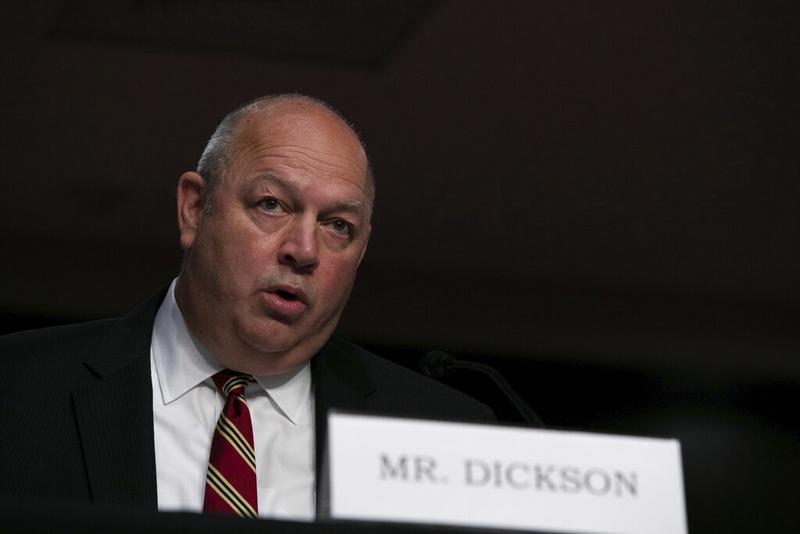 Steve Dickson, administrator of the US Federal Aviation Administration, testifies during a hearing of the Senate Commerce, Science, and Transportation Committee on Capitol Hill in Washington, June 17, 2020. (GRAEME JENNINGS / POOL VIA AP)
Steve Dickson, administrator of the US Federal Aviation Administration, testifies during a hearing of the Senate Commerce, Science, and Transportation Committee on Capitol Hill in Washington, June 17, 2020. (GRAEME JENNINGS / POOL VIA AP)
The head of the Federal Aviation Administration (FAA), Steve Dickson, acknowledged on Wednesday that Boeing Co and the US air safety agency both made mistakes on the 737 MAX jet, but rejected senators' accusations the FAA was "stonewalling" probes after two fatal crashes.
Boeing's 737 MAX has been grounded since March 2019 following crashes in Indonesia and Ethiopia that killed 346 people, triggering multiple investigations into how the plane was certified as safe.
In a particularly tense exchange at a Senate Commerce Committee hearing on aircraft certification, Senator Ted Cruz accused Dickson of speaking in the passive voice as a way of "avoiding responsibility" after Dickson told him, "Mistakes were made."
The manufacturer made mistakes and the FAA made mistakes in its oversight.
Steve Dickson, Head of the Federal Aviation Administration, US
"So unknown somebodies made unspecified mistakes for which there were no repercussions," Cruz said. "What mistakes were made and who made them?"
ALSO READ: US lawmakers fault FAA, Boeing for deadly 737 Max crashes
After a pause, Dickson said, "The manufacturer made mistakes and the FAA made mistakes in its oversight." Dickson then referred to Boeing's development of a flight control system that repeatedly pushed down the jet's nose in both crashes as pilots battled to gain control. "The full implications of the flight control system were not understood as design changes were made," he said.
One senator at the hearing said the agency was like "a dog watching TV" when it came to policing Boeing's work, and another said the agency was "stonewalling" the committee's investigation into the 737 MAX's development.
"Your team at the FAA has attempted deliberately to keep us in the dark," Senator Roger Wicker, the Republican committee chairman, told Dickson.
Dickson told Wicker he was "totally committed to the oversight process."
"I believe it is inaccurate to portray the agency as unresponsive," Dickson said, pointing to its cooperation in multiple investigations. "There is still ongoing work."
After the hearing, an FAA official said the agency has provided "more than 7,400 pages of responsive materials" to the committee and that some material was restricted by international rules on crash investigations.
Dickson said he was "totally committed to the oversight process," after US senators accused the FAA of "stonewalling" the Senate Commerce Committee's investigation into the 737 MAX's development
Boeing declined to comment.
The hearing came a day after Wicker and Senator Maria Cantwell, the ranking Democrat on the committee, introduced bipartisan legislation that would strengthen FAA oversight of Boeing's designs.
The crashes and Boeing's long-delayed efforts to win regulatory approval to return the 737 MAX to commercial service plunged the Chicago-based company into its worst-ever crisis, since compounded by the COVID-19 pandemic.
READ MORE: Boeing MAX papers show 'very disturbing' employee concerns
The Aircraft Safety and Certification Reform Act of 2020, introduced on Tuesday, would give the FAA new authority to hire or remove Boeing employees conducting FAA certification tasks, and grant new whistleblower protections to employees.
Dickson told Cantwell he did not think it would improve safety if the FAA appointed the certification employees, but agreed to look at the Senate proposal.
He also told lawmakers there were many items in the legislation "that are exactly on point," including a provision that would authorize US$150 million over 10 years for new FAA training and to hire specialized personnel.
Michael Stumo, whose daughter died in the Ethiopia crash, which came five months after the crash in Indonesia, applauded such reforms but told lawmakers the bill did not go far enough.
Stumo demanded that manufacturers be subjected to a tougher certification process when they introduce an aircraft derived from models certified years before. The 737 MAX, for example, was derived from a plane first developed in the 1960s.
"The first crash should not have happened," Stumo said. "The second crash is inexcusable."


